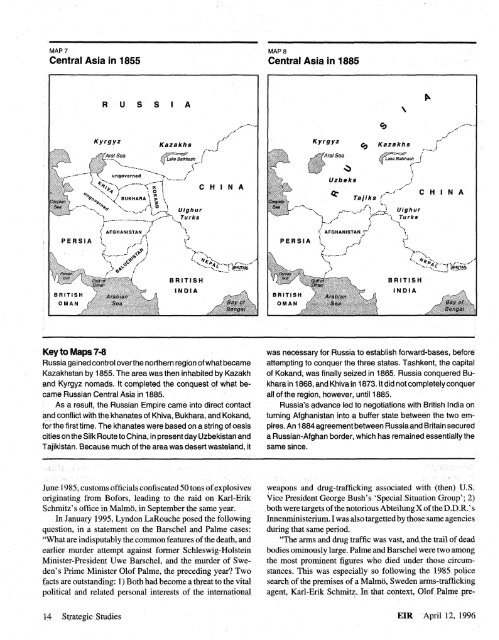Full Issue (PDF) - Executive Intelligence Review
Full Issue (PDF) - Executive Intelligence Review
Full Issue (PDF) - Executive Intelligence Review
You also want an ePaper? Increase the reach of your titles
YUMPU automatically turns print PDFs into web optimized ePapers that Google loves.
MAP 7<br />
Central Asia in 1855<br />
Key to Maps 7-8<br />
Russia gained control overthe northern region of what became<br />
Kazakhstan by 1855. The area was then inhabited by Kazakh<br />
and Kyrgyz nomads. It completed the conquest of what became<br />
Russian Central Asia in 1885.<br />
As a result, the Russian Empire came into direct contact<br />
and conflict with the khanates of Khiva, Bukhara, and Kokand,<br />
for the first time. The khanates were based on a string of oasis<br />
cities on the Silk Route to China, in present day Uzbekistan and<br />
Tajikistan. Because much of the area was desert wasteland, it<br />
June 1985, customs officials confiscated 50 tons of explosives<br />
originating from Bofors, leading to the raid on Karl-Erik<br />
Schmilz's office in Malmö, in September the same year.<br />
In January 1995, Lyndon LaRouche posed the following<br />
question, in a statement on the Barschel and Palme cases:<br />
"What are indisputably the common features of the death, and<br />
earlier murder attempt against former Schleswig-Holstein<br />
Minister-President Uwe Barschel, and the murder of Sweden's<br />
Prime Minister Olof Palme, the preceding year? Two<br />
facts are outstanding: 1) Both had become a threat to the vital<br />
political and related personal interests of the international<br />
MAP 8<br />
Central Asia in 1885<br />
was necessary for Russia to establish forward-bases, before<br />
attempting to conquer the three states. Tashkent, the capital<br />
of Kokand, was finally seized in 1865. Russia conquered Bukhara<br />
in 1868, and Khiva in 1873. It did not completely conquer<br />
all of the region, however, until 1885.<br />
Russia's advance led to negotiations with British India on<br />
turning Afghanistan into a buffer state between the two empires.<br />
An 1884 agreement between Russia and Britain secured<br />
a Russian-Afghan border, which has remained essentially the<br />
same since.<br />
weapons and drug-trafficking associated with (then) U.S.<br />
Vice President George Bush's 'Special Situation Group'; 2)<br />
both were targets of the notorious Abteilung X of the D.D.R. ' s<br />
Innenministerium. I was also targetted by those same agencies<br />
during that same period.<br />
"The arms and drug traffic was vast, and the trail of dead<br />
bodies ominously large. Palme and Barschel were two among<br />
the most prominent figures who died under those circumstances.<br />
This was especially so following the 1985 police<br />
search of the premises of a Malmö, Sweden arms-trafficking<br />
agent, Karl-Erik Schmilz. In that context, Olof Palme pre-<br />
14 Strategic Studies EIR April 12, 1996

















